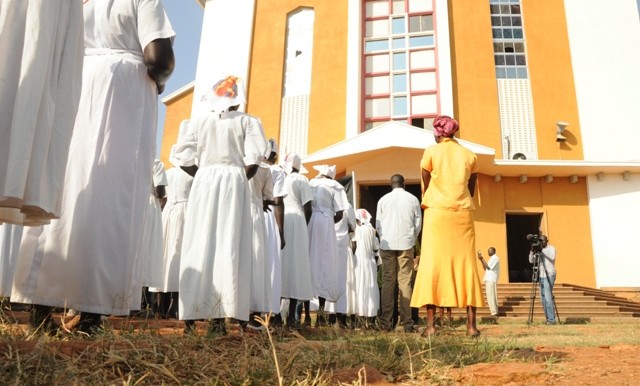Catholic Archbishop Paolino Lukudu warned Monday that “power is not forever,” while urging South Sudanese people to accept they are ethnically divided and seek forgiveness.
Archbishop Lukudu was speaking at at a special service in Juba to mark the one year anniversary of the South Sudan Civil War.
“Somebody wants to be in power forever? It is not like that. It cannot be like that. You have a period to serve, and once it is finished, go and enjoy your brothers and sisters, and you become a normal servant. It is for a period of time, it is never forever,” he said.
The special mass took place after a memorial march from Malakia to Saint Kator Cathedral where mourners wearing black remembered the dead by walking through Juba with “candles of peace.”
At one point during the mass, South Sudanese security personnel entered the church, searching for one of the suspected organizers of the peace march.
In the days prior to the peace protest, security personnel sought to prevent the march from taking place, but it went ahead anyway.
“I think they are misusing power,” the Archbishop told the congregation. “I think we are misusing power, we are overvaluing power, misunderstanding power.”
Lukudu stressed that leaders are mere “servants” who derive their power from the people, not by birthright.
“Power is a humble gift of service to the people at large through the voice of the people for some specific period of time and not forever,” he said. “It is not a thing of my village. Power is not from my village. It is not from my father. It is a vocation.”
Archbishop Lukudu cited the Pope in Rome as an example of a leader who views power appropriately.
“Our Holy Father the Pope generally calls himself the servant of the servants of God,” he explained. “He is the top leadership in the faith and the Pope calls himself ‘servant.’ Very correct. Leadership is not yours.”
‘We have ethnic problems’
The church leader went on to say that South Sudanese citizens must accept that they are divided by ethnicity.
“My brothers and sisters, at times we seem just to be burying our heads in the sand and we do not want to accept some realities of our situation,” he said.
“We need to recognize that we have a problem. We have tribal problems. We have ethnic problems.”
He said the problem of tribalism can only be addressed if it is acknowledged first.
“We must accept [our problems],” he said. “Then we should be able to address them peacefully, honestly, and correctly…rather than hiding them.”
The church elder closed his sermon by encouraging South Sudanese to begin reconciliation.
“Let us have the courage to say, ‘I forgive you. I am sorry. Forgive me, and I’ll forgive you,’ ” he said.
“Let us forgive one another, forgive and pardon, give and receive, so that we can be forgiven in this country…so we can begin a new life. Enough is enough, let us not again be bitter towards one another, we dont want again to fight and kill ourselves.”



